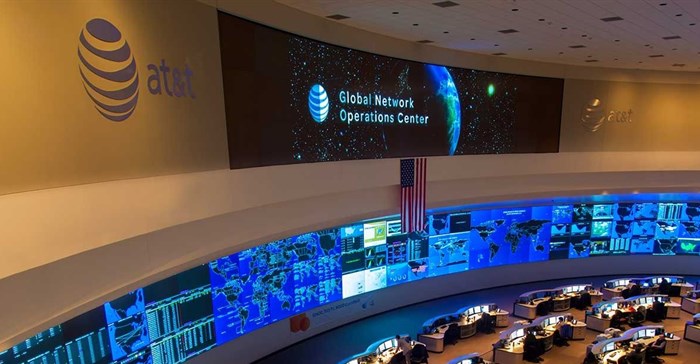AT&T will use Time Warner as 'weapon' if merger goes ahead: US Justice Dept

Lawyers offered contrasting arguments in US federal court Thursday as the trial kicked off over the government's lawsuit seeking to block the $85bn merger of the largest US pay-TV operator with one of the biggest media-entertainment firms.
Craig Conrath, the US Justice Department attorney arguing for the government, said the tie-up would give AT&T an unfair edge against rival companies and lead to higher prices for the nation's 90 million pay TV subscribers.
"Prices would go up, innovation would go down," Conrath said in his opening statement in the bench trial before US District Judge Richard Leon.
Vertical integration
Conrath maintained that AT&T would get "must have" television content by acquiring Time Warner units including HBO and Turner Broadcasting that would allow it to charge higher prices to rival TV distributors and harm emerging internet platforms that need the sought-after programming.
"Vertical integration in this industry can indeed be a weapon to hinder competition," the government lawyer said.
He argued that AT&T would have both the incentive and the ability to "slow innovation and protect its cash cow," referring to its DirecTV and cable subscription TV services.
"It would give AT&T the power to squelch competition," he said.
Conrath said a government expert to be called at the trial would reveal the results of a study showing consumer costs for pay TV could rise by more than $400m annually if the merger goes ahead.
Cutting the cord
But Daniel Petrocelli, the lawyer for AT&T and Time Warner, said in his opening argument that consumers would benefit from a combined firm that competes against tech giants which are dominating advertising and moving increasingly into television.
"All these (tech) companies are running away with the industry, they are transforming it," Petrocelli said.
He said pay TV firms can no longer rely on selling big bundles of channels because "everybody is cutting the cord" and many younger consumers "are not even going into the system."
Disputing the government's claim that prices would rise for consumers, Petrocelli said the combined firm would be able to perform better in advertising by using data on consumers that AT&T has but Time Warner lacks.
AT&T would be able to deliver more targeted ads like Google and Facebook and charge more than Time Warner now is able to do, easing pressure on pay TV subscription prices, the attorney claimed.
No direct relationship with customer
Time Warner now is "a wholesaler, they don't have a direct relationship with the customer," Petrocelli said.
By offering tailored, internet-style ads, "that will allow (Time Warner) to reduce its prices – as advertisers pay more, consumers pay less."
The case is the highest-profile antitrust battle to hit the courtroom since the Microsoft trial in the 1990s and the first involving a "vertical" merger of companies which are not direct competitors in an industry sector.
Many consumer groups have backed the Trump administration's decision to challenge the merger, but some analysts say the move could chill other big corporate tie-ups and possibly create problems for dominant tech firms.
Most antitrust investigations are settled with an agreement calling for divestitures or other actions to preserve competition, so the court showdown represents a risk for both sides, analysts said.
Adding a political dimension to the trial is the feud between President Donald Trump and Time Warner unit CNN – which the White House regularly attacks as "fake news."
Judge Leon, however, has refused to hear evidence showing AT&T was singled out for prosecution.
No harm to competition
Legal experts note that blocking the deal would go against a decades-long precedent of allowing these kinds of vertical tie-ups. But they are divided over the likely outcome.
In 2011, a similar merger between Comcast and NBCUniversal won court approval, with some conditions.
AT&T argues the same precedent applies to its vertical merger and evidence will show the Comcast/NBCU merger "resulted in no harm to competition whatsoever."
AT&T chief Randall Stephenson and Time Warner CEO Jeff Bewkes were in attendance for the opening statement in the trial, which could last six to eight weeks.
The deal announced in late 2016 would give AT&T – a leading wireless telecom group with some 23 million pay TV customers via cable and its DirecTV unit – the assets of Time Warner, including the Warner Bros studios, HBO, Turner Broadcasting and CNN.
Source: AFP via I-Net Bridge.
Source: I-Net Bridge

For more than two decades, I-Net Bridge has been one of South Africa’s preferred electronic providers of innovative solutions, data of the highest calibre, reliable platforms and excellent supporting systems. Our products include workstations, web applications and data feeds packaged with in-depth news and powerful analytical tools empowering clients to make meaningful decisions.
We pride ourselves on our wide variety of in-house skills, encompassing multiple platforms and applications. These skills enable us to not only function as a first class facility, but also design, implement and support all our client needs at a level that confirms I-Net Bridge a leader in its field.
Go to: http://www.inet.co.za






